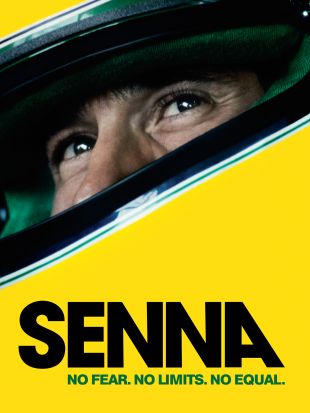Formula One auto racing is the fastest sport on Earth and one of the most risky -- a miscalculation of a fraction of a second can mean the difference between life and death at over 200 miles per hour -- and in this game, few men were faster and better on the track than the Brazilian driver Ayrton Senna, who in his ten years of Formula One competition won the world championship three times. Though Senna died in 1994 at the age of 34, he's still celebrated by race enthusiasts as one of the true greats of the sport, and in Brazil he's a hero -- a man who brought pride and acclaim to his nation at a time when the country's image was in need of repair. It says a great deal about Ayrton Senna that 17 years after his death, Senna, a feature-length documentary about him, has not only received an international theatrical release but become a box-office success in Europe and the U.K. While that's surely a product of the man and his formidable legacy, director Asif Kapadia has also fashioned a compelling tribute that pays homage to Senna the racer as well as the man off the track.
Senna begins where the man got his start on the track, racing go-karts as a teenager, and the youngster was good enough at it to compete on an international level before he moved on to full-size cars. Ayrton Senna was raised in a nurturing middle-class household where his parents urged him to make the most of his talent, but it's clear he was gifted enough that he only needed their help for so long. Several times in the film, Senna speaks wistfully of his days racing go-karts, describing it as "pure racing" with no money, egos, or internal politics getting in the way. Senna features plenty of footage of his great moments on the track (including several dazzling sequences in which a camera was mounted inside his car, offering a first-person glimpse of the demanding terrain of a Grand Prix course), and the movie leaves little room to question his world-class skills. However, the film also deals with the many external controversies of Senna's career -- his combative relationship with sometime teammate and sometime rival Alain Prost, his skirmishes with Jean-Marie Balestre (the former president of Formula One's international governing body, Fédération Internationale de Sport Automobile, who displayed a Gallic partiality to Prost in a dispute over the 1989 world championship), the realities of dealing with sponsors and racing teams, and his battles to make the sport safer.

Director Kapadia built Senna entirely from existing footage -- while several new interviews were conducted with the racer's friends, siblings, and colleagues, they're only heard in voice-over, and instead Kapadia keeps the visual focus squarely on Senna throughout. Early on, the film suffers from the fact that Senna initially seemed to be a great driver without much of a personality -- he was a nice kid who really knew how to drive and that's about it -- but as his greater success puts unexpected obstacles in his path, we learn more of the man inside the fire-proof suit. Senna tells the story of a fellow who wasn't arrogant but justifiably confident in his abilities, one who didn't need to be prodded to stand up for himself, and saw racing as a philosophical pursuit as much as a competition. The film also touches on Senna's strong but pragmatic Catholicism without digging too deep for details, offers an admiring look at his close relationship with his family and his charitable activities, and nods briefly to his reputation as a ladies' man without making much of it (Senna was romantically involved with several well-known models and Brazilian television stars, no great surprise for a wealthy and internationally famous sports figure with the good looks of a movie star). As Ayrton Senna's life and career becomes more complex, so does he, and he becomes a more interesting figure to watch, while the racing footage (edited to keep the material exciting even if you know who is going to win) is consistently impressive throughout.
Senna is more of a tribute than a biography, and Kapadia is unwavering in his devotion to the driver, but the film also makes the case that people admired him for good reasons, and while this movie will appeal most to race fans, it's also a well-told tale of a man who clearly made the most of his 34 years on this Earth.
